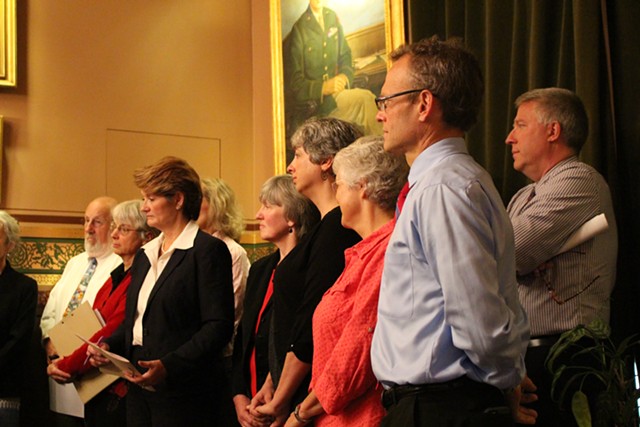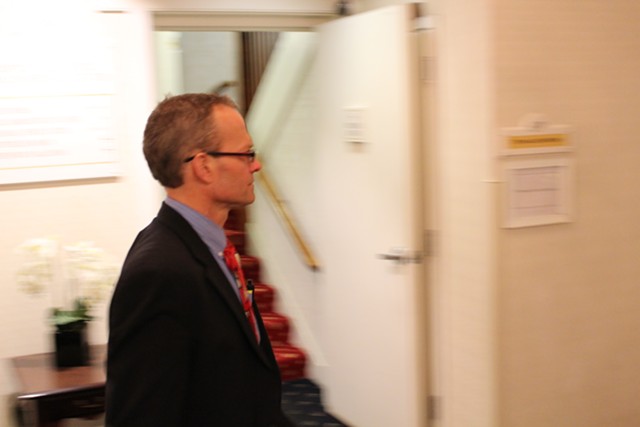
- File: Paul Heintz
- Rep. Willem Jewett (D-Ripton) at a House Democratic press conference last week at the Statehouse.
When House Democrats held a rare Statehouse press conference last Wednesday promising to confront rising property taxes, their Republican opponents rolled their eyes.
"It's kind of interesting that a couple weeks before the election, after having done nothing for years, they're finally finding religion on property tax reform," Rep. Kurt Wright (R-Burlington) said at the time. "I welcome that, but I think voters should always be wary of near-election-time conversions."
This week, House Democratic leaders appear to have found religion on another subject: the influence of money in politics.
After spending the last two years raising campaign cash from out-of-state corporations and in-state lobbyists, House Dems issued a press release Thursday complaining about the sudden influx of such money in support of Republican candidates.
"Campaigns should be about competing ideas," House Majority Leader Willem Jewett (D-Ripton) said in the release. "Democratic House candidates will not be deterred by this out-of-state organization's excessive efforts on behalf of select Republican candidates."
Jewett was referring to the Republican State Leadership Committee, which signaled its arrival in Vermont two weeks ago
by spending $143,000 on a television advertising campaign. Within days, it had spent another $100,000 on radio, postcards and online ads supporting state senate candidates in Franklin, Rutland, Washington and Orange counties. On Wednesday, it dropped another $48,000 — this time on postcards supporting 25 House candidates.
The RSLC's largest contributors include tobacco giant Reynolds American, Inc., the U.S. Chamber of Commerce and Koch Industries.
In an interview Thursday, Jewett complained repeatedly about "the pile of out-of-state money" the RSLC dumped on Vermont. But he seemed to have forgotten about the special-interest cash his own leadership team has collected on his watch.
"I don't think you'll find this stuff going on on this side of the ledger, but I'll leave that to you," he said.
OK.
To refresh Jewett's memory, here are a few of the out-of-state corporations and special-interest groups that have given to the House Democrats' three political action committees just this year: Verizon ($1,000), Armedica ($2,000), DISH Network ($1,750), Walgreens ($750), International Brotherhood of Teamsters ($1,000), Pharmaceutical Researchers and Manufacturers of America ($2,000), Corrections Corporation of America ($1,500), Comcast ($1,500), Caremark ($500), Federal Express ($1,000), New England Cable & Telecommunications Association ($1,500), American Insurance Association ($1,000), Coca-Cola ($1,000), AT&T ($500), Marijuana Policy Project ($1,000), Pfizer ($750), Maximus ($2,000), DirecTV ($750), MVP Health Care ($1,000), Reynolds American, Inc., ($1,000), Anheuser-Busch ($2,000) and Keystone Automotive Industries ($500).
Jewett may have also forgotten about
the $500-a-head fundraiser his caucus held just down the street from the Statehouse last May as the legislature was nearing passage of the session's major bills.
Seven Days observed nearly two dozen lobbyists and a dozen Democratic lawmakers breezing into the Capitol Plaza Hotel for the event.
In case he forgot, here's a photo of Jewett arriving at the fundraiser. (He didn't stop to chat with us at the time.)

- File: Paul Heintz
- Rep. Willem Jewett arrives at a lobbyist fundraiser for House Democrats in May 2014.
Jewett may also have forgotten that when House Republicans proposed new campaign-finance rules in January 2013,
he poo-pooed their ideas and argued that additional disclosure mandates were not necessary. Or that in January 2014,
House Democrats voted 124 to 15 in favor of doubling the amount of money statewide candidates could raise from individuals, corporations or PACs — and quintupling the amount political parties could raise from those entities. Or that it was House negotiators
who insisted on removing from that bill a proposed requirement to list donors' occupations and employers on disclosure forms.
Jewett may have forgotten that his party's top statewide officials — Sen. Patrick Leahy (D-Vt.), Congressman Peter Welch (D-Vt.) and Gov. Peter Shumlin — have raised hundreds of thousands of dollars from corporations, lobbyists and PACs over the years.
Then again, the majority leader poses a thoughtful question about why out-of-state special interests might invest in Vermont political campaigns.
"You have to ask yourself what are they trying to get for that?" he said of the RSLC.
What, indeed?
And what exactly was Verizon trying to get when it cut its latest $500 check to the Vermont Democratic House Campaign PAC just two weeks ago?
"I have no idea," Jewett says.












Comments (5)
Showing 1-5 of 5
Comments are closed.
From 2014-2020, Seven Days allowed readers to comment on all stories posted on our website. While we've appreciated the suggestions and insights, right now Seven Days is prioritizing our core mission — producing high-quality, responsible local journalism — over moderating online debates between readers.
To criticize, correct or praise our reporting, please send us a letter to the editor or send us a tip. We’ll check it out and report the results.
Online comments may return when we have better tech tools for managing them. Thanks for reading.